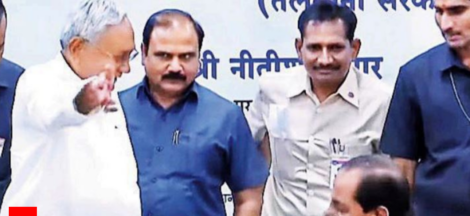By Barun Das Gupta
In the general elections held
in Bangladesh on December 30, the Awami League-led Jatiya Oikya Front won a
massive victory. So massive, indeed, that it has raised many eyebrows. In a 300
member parliament, elections were held for 299 seats. The Jatiya Oikya Front
won 288 of them, the Awami League (AL) alone winning 259 seats. The Opposition
National United Front (NUF) won just seven and independents another 4.
Incidentally, it was the 11th general election after Bangladesh was born.
The Opposition has alleged
massive rigging by the AL and resorting to threats and intimidations by it. The
AL counters the opposition charge by pointing out that most of the 19 persons
who were killed in poll-related clashes on the polling day were their workers.
The opposition has demanded that the elections be declared null and void by the
Election
Commission and fresh poll held
under a ‘neutral’ government. The demand is certainly not going to be accepted
by the ruling coalition which is gloating over its scale of victory which is
both unprecedented and unexpected.
Most foreign media have
reported the opposition charge of rigging.. Even the Daily Star of Dhaka,
considered friendly to the ruling dispensation, reported the scene on the
polling day thus:
“It was something hardly seen
ever in any election in the country — finding trace of the key opposition
party was a real challenge, except for in its electoral symbol on ballot
papers.
“A few polling agents,
posters, supporters or loyal voters of the BNP could rarely be seen by The
Daily Star in polling centres across Dhaka. As if a miracle force wiped out
most of them on the day of the national election yesterday.
“All one could see was BNP’s
political rival, the ruling Awami League. The signature of AL was all over the
places so much so that the polls looked to be participated by none but one
party.
“Gatherings of AL men outside
polling centres, voting slips of AL candidates, polling agents of AL and
journey from gates of polling centres to booths looked after by AL were the
features of the day.”
Former Bangladesh President
Hussain Mohamed Ershad’s Jatiya Party, a constituent of the AL-led front, came
second, winning 20 seats.
Will the just held elections
bring to an end the confrontationist politics of the two major political fronts
– one led by the AL and the other by the BNP, whose leader Begum Khaleda Zia is
serving a ten year prison term? Bangladesh watchers think it hardly likely. In
an interview, eminent writer and intellectual Akbar Ali Khan has said:
“Two fronts participated in
this election. Both the fronts have been engaged in a politics of conflict for
a long time. The conflict did not end with the present election. The same
politics of confrontation continues. So, we are entering 2019 with the same
politics of confrontation. It is unfortunate for us that no political party
took the initiative to lessen the intensity of this confrontation.”
This succinctly sums up the
present situation and portends the future. In fact, some observers believe that
the ‘massive/’ victory of the ruling AL and the equally ‘massive’ defeat of the
opposition front may drive the fundamentalist elements to desperation. Particularly
the section of youth which is under the influence of the opposition parties may
lose faith in parliamentary democracy. The possibility of their getting
‘outside’ support cannot be ruled out.
Both Pakistan and China are
closely watching the political situation in Bangladesh. There have been reports
of ISI helping fundamentalist forces with money and material. If desperation
drives the extremist sections underground, it may be a cause of worry for Prime
Minister Sheikh Hasina.
The allegation of rigging
cannot be rejected out of hand. Even the foreign press has reported cases of
bunches of ballot papers being ‘”stuffed” into ballot boxes by policemen.
Workers of the opposition NUF were allegedly chased away from the vicinity of
polling booths, with the AL men having a field day for themselves.
This is not to say that the
Awami League would not have won if there were no ‘hyperactivity’ of its workers
and supporters. The ruling party would have won but its victory would have been
more credible and convincing and not been mired in controversy.
In the opinion of Kamal
Hossain, chairman of the opposition NUF, “These are actions of a nervous
regime, which feels that power is slipping from its hands. Now, they are doing
these extraordinary things of arresting people right, left and centre, using
police in a way that shames me because I have been part of the writing of the
original constitution in 1972.”
Sheikh Hasina has won. Her
party and her front have been returned to power again for the third consecutive
term. But her opponents have not accepted and reconciled themselves to the poll results. How they react and what
they do remains to be seen. If there is a turn to more intense fundamentalism
and Islamist radicalism, will the parliamentary opposition go with them or will
there be a schism in the opposition ranks?
Whatever happens, Bangladesh politics is destined to remain in a flux
for a long time, as Akbar Ali Khan has visualized.(IPA Service)
The post Confrontation Politics To Intensify In Bangladesh appeared first on Newspack by India Press Agency.


